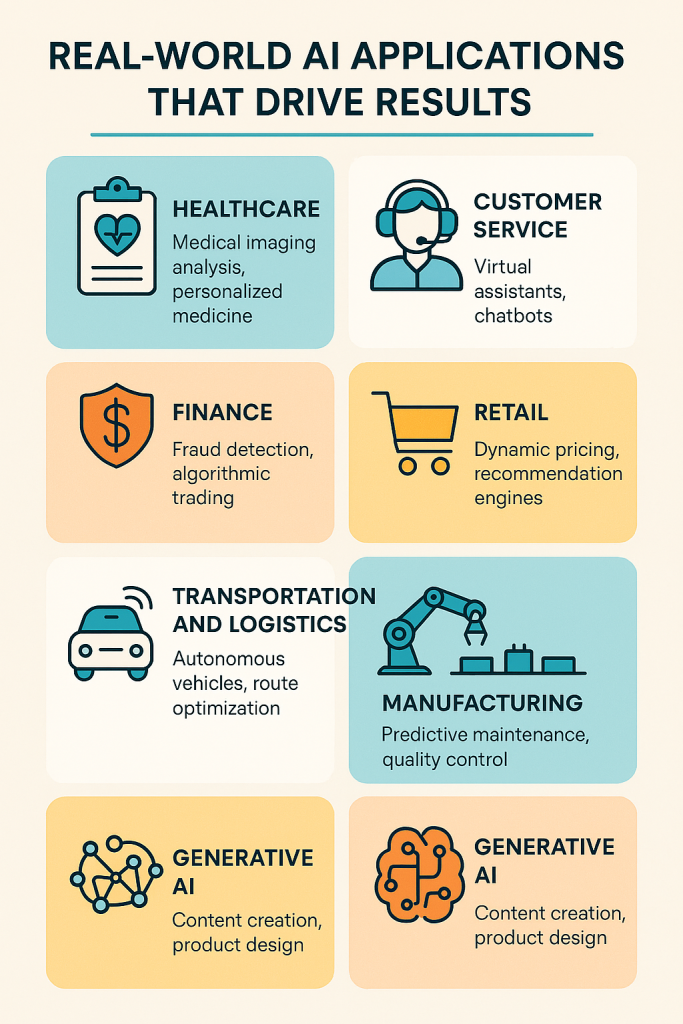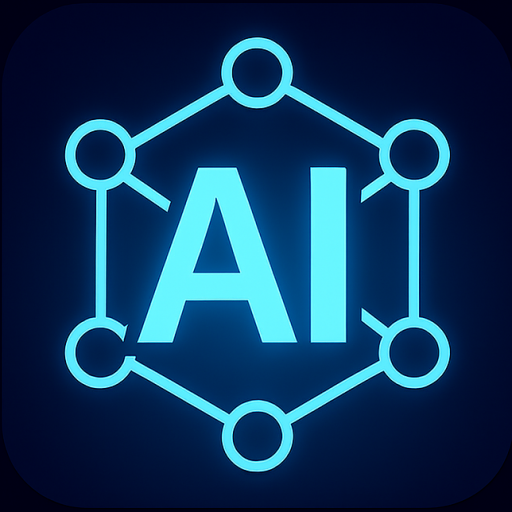
Real-World AI Applications That Drive Results
Artificial intelligence is no longer a futuristic concept. It is a practical, measurable driver of business value and operational efficiency across industries. From healthcare to logistics, AI is delivering tangible results by automating processes, enhancing decision-making, and creating new customer experiences. This article explores some of the most impactful real-world AI applications in use today, backed by verifiable examples.
Healthcare: Improving Outcomes and Efficiency
AI is transforming healthcare by enabling earlier diagnoses, personalized treatments, and more efficient operations. According to Forbes, machine learning algorithms are now used to detect diseases such as cancer and diabetic retinopathy with accuracy comparable to or exceeding human specialists.
Key applications include:
- Medical Imaging Analysis: AI models can process thousands of scans quickly, flagging anomalies for radiologists to review.
- Personalized Medicine: Algorithms analyze genetic data to recommend tailored treatment plans.
- Remote Monitoring: Wearable devices and IoT-enabled sensors track patient vitals in real time, allowing proactive intervention for chronic conditions.
- Mental Health Support: AI-powered chatbots and virtual therapists provide accessible, personalized support for anxiety and depression.
These solutions reduce diagnostic errors, shorten treatment timelines, and improve patient engagement.
Customer Service: Scaling Personalization
AI-powered virtual assistants and chatbots are now standard in customer service, providing 24/7 support and reducing wait times. Natural language processing enables these systems to understand and respond to queries in conversational language.
Examples include:
- Sentiment Analysis: Businesses use AI to detect customer emotions in messages or calls, allowing agents to adjust their tone and approach.
- Recommendation Engines: Platforms like Amazon and Netflix use AI to analyze purchase or viewing history and suggest relevant products or content.
- Automated Ticket Routing: AI systems categorize and assign support tickets to the right teams, improving resolution speed.
The result is higher customer satisfaction and lower operational costs.
Finance: Enhancing Security and Decision-Making
Financial institutions are leveraging AI for fraud detection, credit scoring, and algorithmic trading. AI models can identify suspicious transactions in milliseconds, reducing fraud losses.
Notable uses include:
- Fraud Detection: Machine learning models analyze transaction patterns to flag anomalies.
- Risk Assessment: AI evaluates creditworthiness using a broader set of data points than traditional scoring methods.
- Algorithmic Trading: AI systems execute trades based on real-time market data, optimizing for speed and profitability.
Banks like Citi and Deutsche Bank are also using AI to monitor markets and improve compliance processes.
Retail: Driving Sales and Operational Efficiency
Retailers are using AI to optimize inventory, forecast demand, and personalize marketing.
Applications include:
- Dynamic Pricing: AI adjusts prices in real time based on demand, competition, and inventory levels.
- Visual Search: Customers can upload images to find similar products instantly.
- Supply Chain Optimization: AI predicts demand spikes and adjusts procurement to prevent stockouts or overstocking.
Companies like Walmart and Zara have reported improved sales and reduced waste through AI-driven inventory management.
Transportation and Logistics: Optimizing Movement
AI is improving route planning, fleet management, and predictive maintenance in transportation.
Examples include:
- Autonomous Vehicles: While still in development, AI already powers advanced driver-assistance systems in cars from Tesla, Mercedes-Benz, and GM.
- Predictive Maintenance: AI analyzes sensor data from vehicles to predict component failures before they happen.
- Route Optimization: Logistics companies use AI to calculate the most efficient delivery routes, reducing fuel costs and delivery times.
Manufacturing: Increasing Productivity
Manufacturers are adopting AI for quality control, process optimization, and predictive maintenance.
Key applications:
- Computer Vision for Quality Inspection: AI detects defects in products faster than human inspectors.
- Process Automation: AI optimizes production schedules and resource allocation.
- Energy Management: AI systems monitor and adjust energy usage to reduce costs.
Generative AI: Creating New Value
Generative AI is enabling businesses to create content, code, and designs at scale. According to Google Cloud, companies like Wendy’s and Papa John’s are using predictive AI to speed up order processing, while Samsung integrates AI into devices for more responsive features.
Applications include:
- Content Creation: AI generates marketing copy, product descriptions, and even video scripts.
- Code Generation: Developers use AI to write and debug code faster.
- Product Design: AI assists in creating prototypes and testing variations virtually.
Conclusion: AI as a Strategic Imperative
The examples above show that AI is not just a technological upgrade but a strategic imperative. Organizations that adopt AI thoughtfully are seeing measurable gains in efficiency, revenue, and customer satisfaction. The key to success lies in aligning AI initiatives with clear business goals, ensuring ethical use, and continuously measuring results.

Leave a Reply